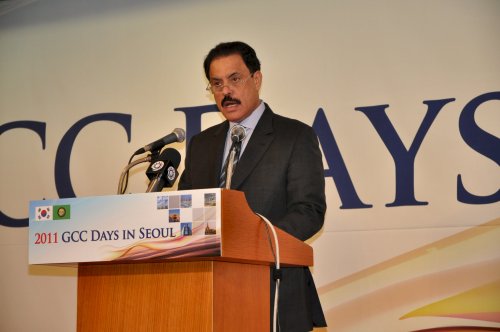Relations between Arabian countries and South Korea date back to the 7th century when Arab traders used the peninsula as a gateway to the Far East.
Ties between the six GCC member states and Korea have flourished since the Korean War into a beneficial relationship that goes beyond trade and includes culture, tourism and infrastructure development.
“GCC countries value and have benefited from this strong relationship,” said Cooperation Council for the Arab States of the Gulf Secretary General Abdulrahman Bin Hamad Al-Attiyah.
“In order to further develop this relationship, culture, economy, and energy are areas we need to further strengthen cooperation,” he added.
Last week, local embassies representing five of the six member states organized, for the first time in Asia, a seminar for members of both sides.
Ties between the six GCC member states and Korea have flourished since the Korean War into a beneficial relationship that goes beyond trade and includes culture, tourism and infrastructure development.
“GCC countries value and have benefited from this strong relationship,” said Cooperation Council for the Arab States of the Gulf Secretary General Abdulrahman Bin Hamad Al-Attiyah.
“In order to further develop this relationship, culture, economy, and energy are areas we need to further strengthen cooperation,” he added.
Last week, local embassies representing five of the six member states organized, for the first time in Asia, a seminar for members of both sides.

Two-way trade between the GCC countries of Bahrain, Kuwait, Oman, Qatar, Saudi Arabia and the United Arab Emirates grew to $78 billion last year, according to the Korea International Trade Association, with imports to Korea hitting $66 billion.
“This is a remarkable jump compared to 2000 when our exports to South Korea were $19 billion,” he noted.
Established in 1981, the GCC member states hold around 40 percent of the world’s oil reserves with Korea being one of the top trading partners.
“Simply put, our economic and trade relations with South Korea are on track and moving forward to achieve development and growth,” said Al-Attiyah.
In the summer of last year, both sides took big strides toward concluding a free trade agreement, although there are some remaining sensitive issues to be resolved.
Launched in 2008, the group of six oil-producing Gulf States has had three rounds of free trade talks so far.
“The purpose of these negotiations is to create a free trade zone by reaching an agreement, that includes many clauses and chapters on trade, services and investments and also includes legal appendixes,” he said.
During the last meeting in July 2010, both sides reached agreements on almost all sectors including investment, services and rules of origin, although both sides agreed that more talks were needed to further examine some stickier issues such as tariff concessions on automobiles, electronics and steel products.
While trade talks seem to be stalled, Al-Attiyah reiterated that both sides need to redouble efforts to strike a free trade deal.
Al-Attiyah has noted in the past that Korea needs to show flexibility on tariff concessions.
“We need to build on our success through this dialogue and by doing so further strengthen our ties,” said Al-Attiyah.
Cultural relations are another sector that Al-Attiyah would like to see developed.
Basing it on human exchanges, Al-Attiyah believes that the cultural wing of the relationship will only strengthen which will trickle down to other important areas such as trade and tourism.
“By doing so I think we will have a bright future,” he said.
One of the group’s goals is to build a common market that enhances economic cooperation between its members as well as build economic relations.
In doing so, GCC countries have coordinated and standardized economic and financial policies and legislation relating to industry and customs.
In 2003, a customs union was established between its members and as a group, the GCC endeavors to achieve a single market gradually.
By Yoav Cerralbo (yoav@heraldcorp.com)







![[KH Explains] How should Korea adjust its trade defenses against Chinese EVs?](http://res.heraldm.com/phpwas/restmb_idxmake.php?idx=644&simg=/content/image/2024/04/15/20240415050562_0.jpg&u=20240415144419)










![[Today’s K-pop] Stray Kids to return soon: report](http://res.heraldm.com/phpwas/restmb_idxmake.php?idx=642&simg=/content/image/2024/04/16/20240416050713_0.jpg&u=)